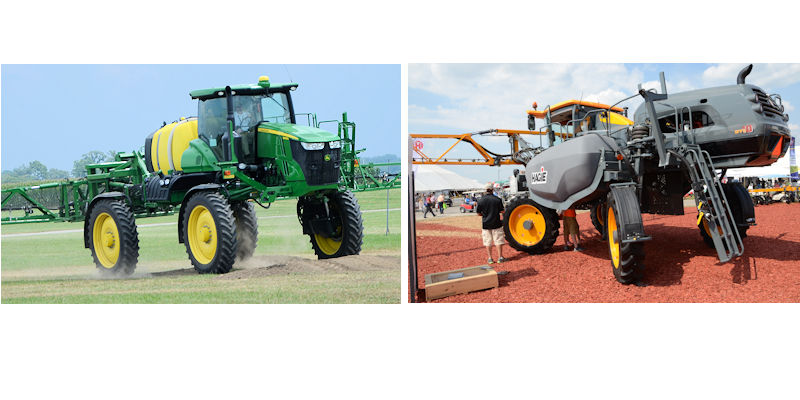March 30, 2016

This week John Deere announced it was entering into an agreement that would give the company majority ownership of Hagie Mfg. This innovative Iowa sprayer manufacturer has carved a solid niche in the market with its forward-boom, high-clearance sprayer design. And within 15 months those sprayers will be sold and serviced by the larger John Deere dealer network.
About six years ago New Holland started selling sprayers from Miller-St. Nazianz, also makers of a forward-boom sprayer. New Holland later bought the company. Earlier this year Exel Industries, a French equipment maker, purchased Equipment Technologies, maker of Apache Sprayers. Now John Deere makes its move on Hagie Mfg. In the grand scheme of things it makes sense. In a market slump smaller companies with different capitalization profiles may have a need to seek a buyer/owner with a bigger wallet.
In the case of Hagie, the deal is not an outright purchase, but a partnership, though John Deere does get a majority ownership stake in the company. John Deere will maintain the brand name and the sprayers will continue to be made in Clarion, Iowa. In the media statement announcing the move, Alan Hagie, CEO, Hagie Mfg., says: "We have great products at Hagie that help producers be more profitable but we need a business model that helps us reach more customers. This partnership with Deere allows our solutions to reach customers on a global scale and ensure they are supported with the world-class Deere dealer organization."
Hagie also offers a video statement on the company's Facebook page that fills you in on more details about what drove the decision.
For John Deere, the move gives the company access to an advanced sprayer line with features unique to Hagie. John May, president, Agricultural Solutions and Deere's Chief Information Officer adds: "High-clearance spraying equipment is a new market for Deere. The expertise at Hagie allows John Deere to immediately serve customers who need precision solutions that extend their window for applying nutrients."
These moves, however, also offer a kind of "throwback" feeling to what happened in the 1980s. That was when several short-line equipment makers ended up getting absorbed into other companies. DMI for example, was acquired by Case IH – the company still uses the Ecolo-Tiger brand name. That's just one example. Agco Corporation is actually made up of more than 20 different acquisitions, but several names remain intact – Sunflower and Hesston being two.
Note: And industry colleague reached out and reminded me that many of the moves I note above happened in the early 1990s (not the mid 1980s) in part due to a slump in 1992. The argument could be made that the second slump so close to the soft 1980s market are what drove the moves. I'll just plead to "temporal contraction" a condition where the writer sometimes shrinks time in his head. Either way, what's happening now does recall past times when several acquisitions were happeneing. The 1990s was also a time when crop protection mergers were more common too.

John Deere doubles down on the sprayer market with partnership that gives dealers access to Hagie tech (retaining the Hagie name).
When markets slump some companies need to seek partners, while in other cases companies with deeper pockets see an opportunity to grow market share or solidify their position in a specific industry. John Deere has been a big player in the sprayer market for several years. However, it's more conventional sprayers may have limited the company's options in the market. Hagie Mfg., on the other hand, has been growing its business, but could use added distribution and support rather than its current factory-direct approach; provided the company can retain its identity under the Big Green umbrella, which appears will be the case.
Earlier this year John Deere snapped up Precision Planting from Monsanto. The acquisition gives John Deere a solid position in the newest planting tech – electric meters – for third party users; and access to other farm tech for the future. Yet Precision Planting will remain a standalone brand, as noted in a previous blog. John Deere is finding that there's value in those "competitive" brands even when part of the company stable.
John Deere's challenge going forward is to promote innovation with these acquisitions, which is the inventive culture these companies had in the first place. Fostering that could bring a bright future of new products and services from John Deere.
You May Also Like




